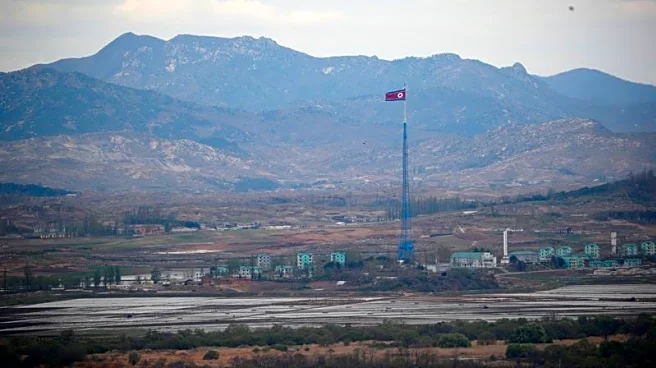(Reuters) -South Korea intends to restore an agreement to suspend some military activity along the border with North Korea, President Lee Jae Myung said on Friday, as his government seeks to improve relations between neighbours still technically at war.
The 2018 military accord was designed to curb the risk of inadvertent clashes, but broke down after a spike in tensions.
WHAT HAPPENED IN 2018?
The so-called Comprehensive Military Agreement (CMA) signed between the two Koreas was the most substantive
deal to result from months of historic meetings between leader Kim Jong Un and then-South Korean President Moon Jae-in.
On September 19, 2018, South Korea's defence minister and his North Korean counterpart signed the CMA in the North's capital, Pyongyang, accompanied by polite applause from the onlooking leaders.
Under the CMA, both countries agreed to "completely cease all hostile acts against each other" and implement military confidence-building measures in air, land and sea domains.
The measures included the two sides ending military drills near the border, banning live-fire exercises in certain areas, the imposition of no-fly zones, the removal of some guard posts along the Demilitarized Zone, and maintaining hotlines.
On the ground, both sides agreed to completely cease artillery drills and field training within 5 km (3 miles) of the Military Demarcation Line (MDL) between the countries.
At sea, they installed covers on the barrels of naval guns and coastal artillery and closed gun ports in a buffer zone along the sea border.
MILITARY DEAL FALLS APART
With inter-Korean and denuclearisation talks long stalled, the military accord started to fracture in recent years amid drills and shows of force along the fortified border between the Koreas as they accused the other of breaches.
North Korea's launch of a spy satellite in 2023 further ratcheted up tensions on the Korean peninsula, and the countries walked away from the confidence-building pact.
South Korea's National Security Council that year moved to "suspend the effect of Article 1, Clause 3" establishing no-fly zones close to the border in the 2018 military agreement, enabling Seoul to restore reconnaissance and surveillance activities along the border.
South Korea's military then restarted aerial surveillance in border areas, the defence ministry said.
North Korea in return said its army would "never be bound" by the pact, ripping up the agreement and vowing to restore all military measures it had halted under the deal.
In June 2024, former South Korean President Yoon Suk Yeol declared a complete suspension of the military pact in response to North Korea's move to send hundreds of rubbish-stuffed balloons across the border.
Later that year, as hostilities increased state-run news agency KCNA said North Korea amended its constitution to designate the South as a "hostile state". HOW WILL PYONGYANG RESPOND?
President Lee, who won a snap election in June, has sought to re-engage Pyongyang after a period of cross-border tension and shown a willingness to return to dialogue.
He touted on Friday his government's efforts to ease tensions, including halting the launch of balloons floated by activists with anti-North Korea leaflets and dismantling loudspeaker propaganda broadcasts across the border.
How Pyongyang might respond remains unclear. Top North Korean officials have in recent weeks dismissed moves taken by Lee's new liberal government to ease tensions.
Some analysts are also sceptical about the short-term prospects of a favourable response from North Korea to such overtures.
(Reporting by Ju-Min Park and Heejin Kim; Editing by Ed Davies and Tom Hogue)















